While the rest of the world makes strides in space science and technology research, Pakistan has failed to find its footing in this area, despite Pakistan's Space Programme, the Space and Upper Atmosphere Research Commission, which was the first of its type, in the Muslim world as well as in the developing world. It was established in 1961, with Professor Abdus Salam being its first administrator and director. Pakistan’s lag behind in science and technology obviously became an acute sore point when the Chandrayaan-3 mission made India the first country to reach the lunar south polar region, adding to the achievements of their space programme set up in 1962.
Memes about the flag on the moon vs moon on the flag flooded the internet, while our ministry of science and technology pretended nothing has happened, the drawing room debates on Pakistan’s absence from scientific progress got more heated.
The Express Tribune spoke to the top Pakistani scientist Prof Dr Ghulam Hussain, about the factors that led to Pakistan’s lack of scientific progress and development. He served at the Ghulam Ishaq Khan Institute of Engineering Sciences and Technology from 2015 to 2021, Last October, the Bahrain-based scientist made it to Stanford University’s prestigious list of the top two percent most widely cited scientists in different disciplines and has again been listed this year as one of the world’s top scientists in both the single year and career lists.
Hussain believes that there are several factors working insidiously to hamper Pakistan’s progress in scientific research and development (R&D). This systemic dragnet can mainly be divided into governmental, institutional and national factors.
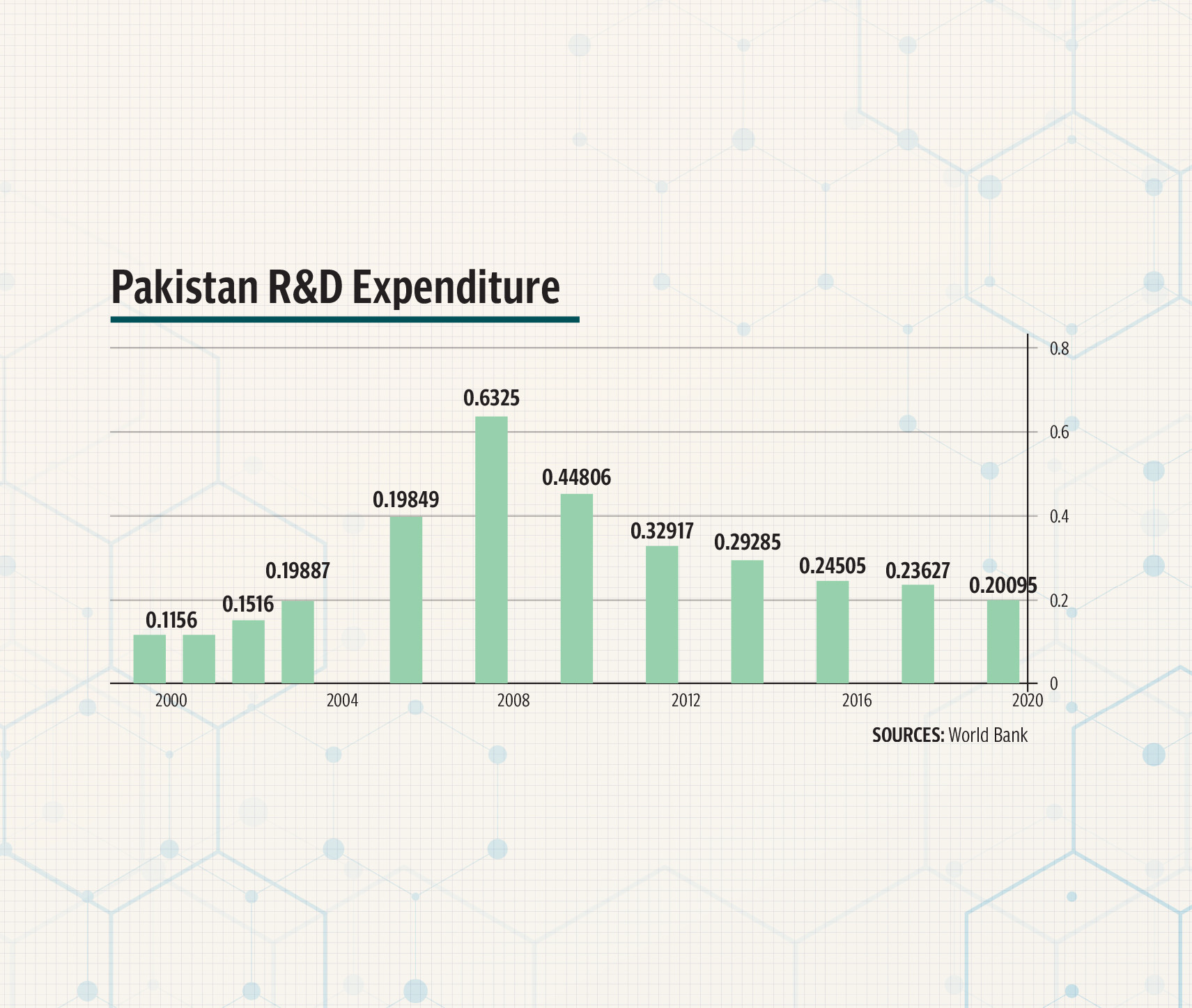 What’s happening at govt level
What’s happening at govt level
“Quality education and R&D, have been addressed by the governments as the least priority areas,” says Hussain. “From 2004 to 2008, the R&D budget witnessed a growth from 0.4%-0.63% of our GDP. That was the period when our academic and research institutions started flourishing, people started doing well in the scientific research — the benefit of which we are yet harnessing in the form of national capacity building in the R&D area, our somewhat improved science index and image, and employability of professors and researchers abroad especially in the Middle East and China. But after 2008, the government kept decreasing the investment in R&D consistently until in 2020, it became 0.2%. Besides positive image building, a lot of revenue comes to Pakistan, as a benefit of that inconsistent investment in the past. If the government had paid more attention to quality education and research in Pakistan, we could have reaped the benefits multifold as there is a tremendous potential here.”
Inconsistent policies and improper implementation
Why was the budget consistently reduced after 2008? “Inexperienced and unqualified leadership is the main reason for this,” says Hussain. “If your political leadership has little or no experience and education, how do you expect them to understand the importance of scientific R&D, knowledge-based economy, and the contemporary needs for transforming an undeveloped nation into a developed one. As they don't understand the importance of knowledge-based economy, they will not be able to foresee and chalk out any systematic and sustainable plan/policies — neither for the quality education and nor for the associated professionals and areas, resulting into poor progress on R&D. Even if we regard these as the minor causes, there are major causes behind the minor ones. The political leadership does not understand science and technology and if they do, it is not more than superficial understanding.”
Why do we have an inexperienced and unqualified leadership? “The reason for that is divided governance in our country,” says Hussain. “This is when political instability comes in, in which case, neither a politician nor a researcher can give an adequate or sufficient attention to anything, while political leaders try to benefit from the situation. Most of our leaders seldom have any stakes in Pakistan. They only emerge in political instability, and not being stakeholders, why would they be interested in R&D or making policies to strengthen Pakistan.
But even during political stability in the country, R&D still remained neglected. “People who come into the government are power hungry,” says Hussain. “They want to wield power and serve their own interests. They do not want to serve the people. Hence the interests of the people and national interests are compromised. Basically, their politics is very traditional, and their planning is makeshift, just to make people happy in the short term to secure votes.”
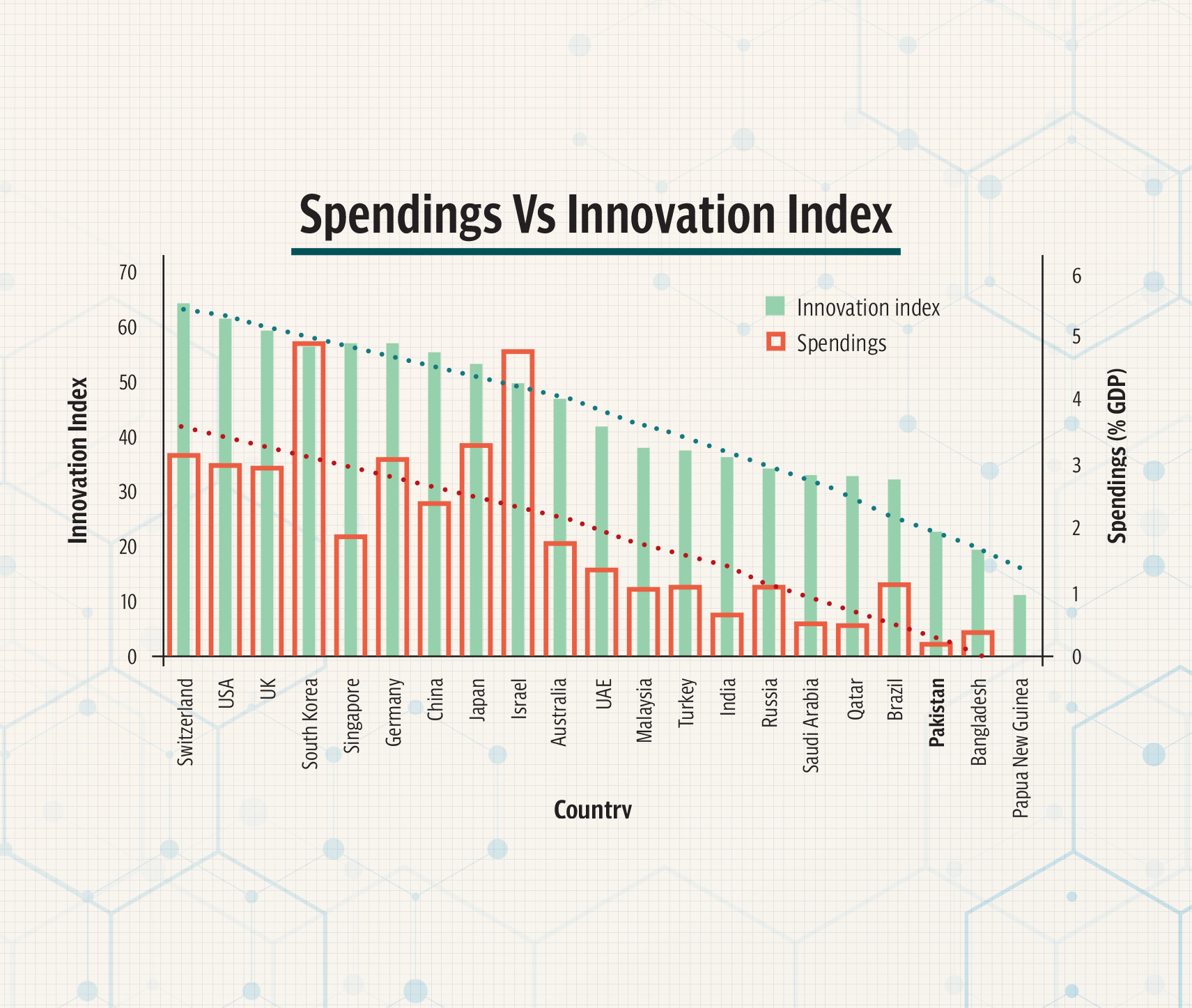
Is there a way out?
“Firstly, we need to get out of political instability,” says Hussain. “Then we should make sure to vote for leaders who will not make makeshift policies but long-lasting ones that lead to the country’s progress in every sector. The mindset of the leadership needs to change to be able to understand the value of political stability, knowledge-based economy and R&D.” This is the time to fix this issue before it is too late for “come back”.
What’s happening at institutional level
Hussain believes that R&D is also being hampered at institutional level. “There is a lack of visionary planning,” he says. “The institution involved in planning has to identify issues and inform the government. A need analysis is done, an investment is made where gaps are found. But in reality, with few exceptions, superficial analysis and planning is done which does not have long-lasting effects. Secondly, when the government makes policies for R&D, the institutions must implement them in true letter and spirit, but the implementation is either poor or the policies are revoked once a new governmental set-up takes over; does not matter if the policies are healthy or unhealthy.”
Hussain explains that there are many reasons for that. “In most cases the policy-making institutions have weak links with the local universities, while universities have weak connections with the industry. So how will R&D progress in true spirit to be useful for socio-economic development?”
He explained how important it is to link international research institutions to our universities to promote R&D. “This is how knowledge transfer takes place,” says Hussain. In this way even if we are falling behind, the knowledge gap can be bridged. Pakistani scholars who are abroad are useful but untapped source. India for instance has strong connections internationally so whenever the international front needs researchers, they tap India and in return they extend help to India when there is a need. China is another worth mentioning example that learned a lot from its talented scholars settled abroad. But our connection with our diaspora, including with scholars, is weak. It is not necessary that only the government itself should in creating a research environment, Pakistani investors sitting abroad can also do that. But the government needs to recognise them and motivate them by formulating encouraging and stable policies.”
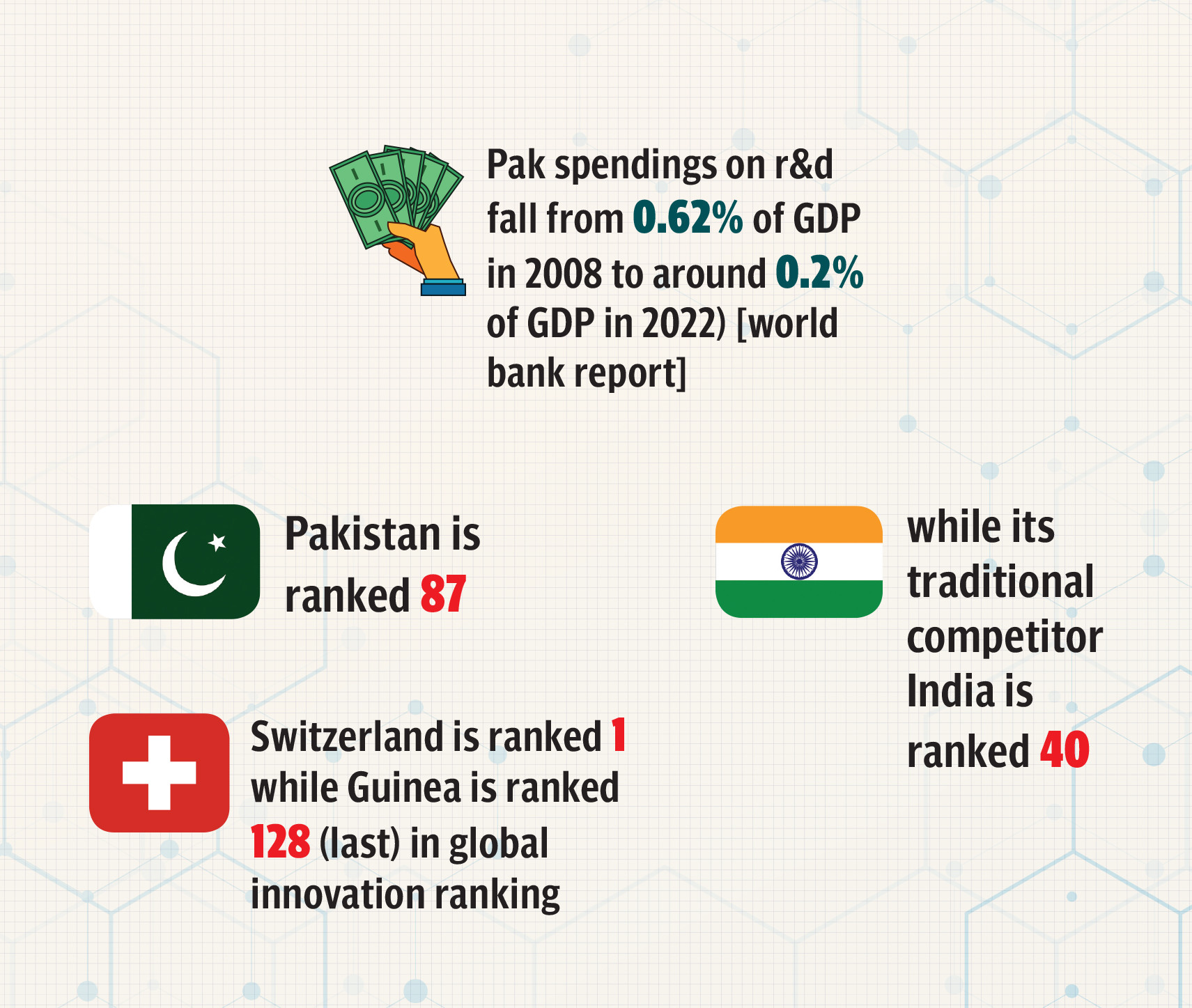 Hussain elaborated how in the past, overseas Pakistani professionals would be humiliated by the officials in our embassies and consulates. It was not so long ago that the situation was rectified by the previous government. “How do you expect a scholar or investor to be motivated if he is treated in an undignified way?”
Hussain elaborated how in the past, overseas Pakistani professionals would be humiliated by the officials in our embassies and consulates. It was not so long ago that the situation was rectified by the previous government. “How do you expect a scholar or investor to be motivated if he is treated in an undignified way?”
Hussain believes that Pakistanis have proved time and again that they have immense potential and talent but political instability and the approach and attitude of the institutions and officials create a huge disturbance for R&D, which requires long-term policy and planning, and a committed, peaceful approach. “It does not run on orders and instruction,” he says. “You have to dig something out of somebody’s mind.”
Hussain believes that most of the people heading institutions does not recognize their responsibility and further there is no one to correct their ideology. “Especially non-academic institutions,” he says. “If they have any fear and sense of national duty, they will definitely perform responsibly. They pretend to be ignorant because they only want to exploit their authority. This happens when governmental or state institutions are weak leading to absence of national goals.”
Hussain also pointed out the culture of disrespect between the departments. “No one wants to work in unity with one national goal,” he says. “One department blames the other and will hold up a file so that another department cannot proceed. Icing on the cake is corruption, bribery resorting to short cuts at institutional level.”
What does the destruction of national character and state institutions have to do with R&D? Hussain believes there is a strong connection. “In this dismal situation, researchers feel demoralized and quit their jobs for opportunities that they find abroad,” he says. “Governance, state institutions, national character, all are strongly connected.”
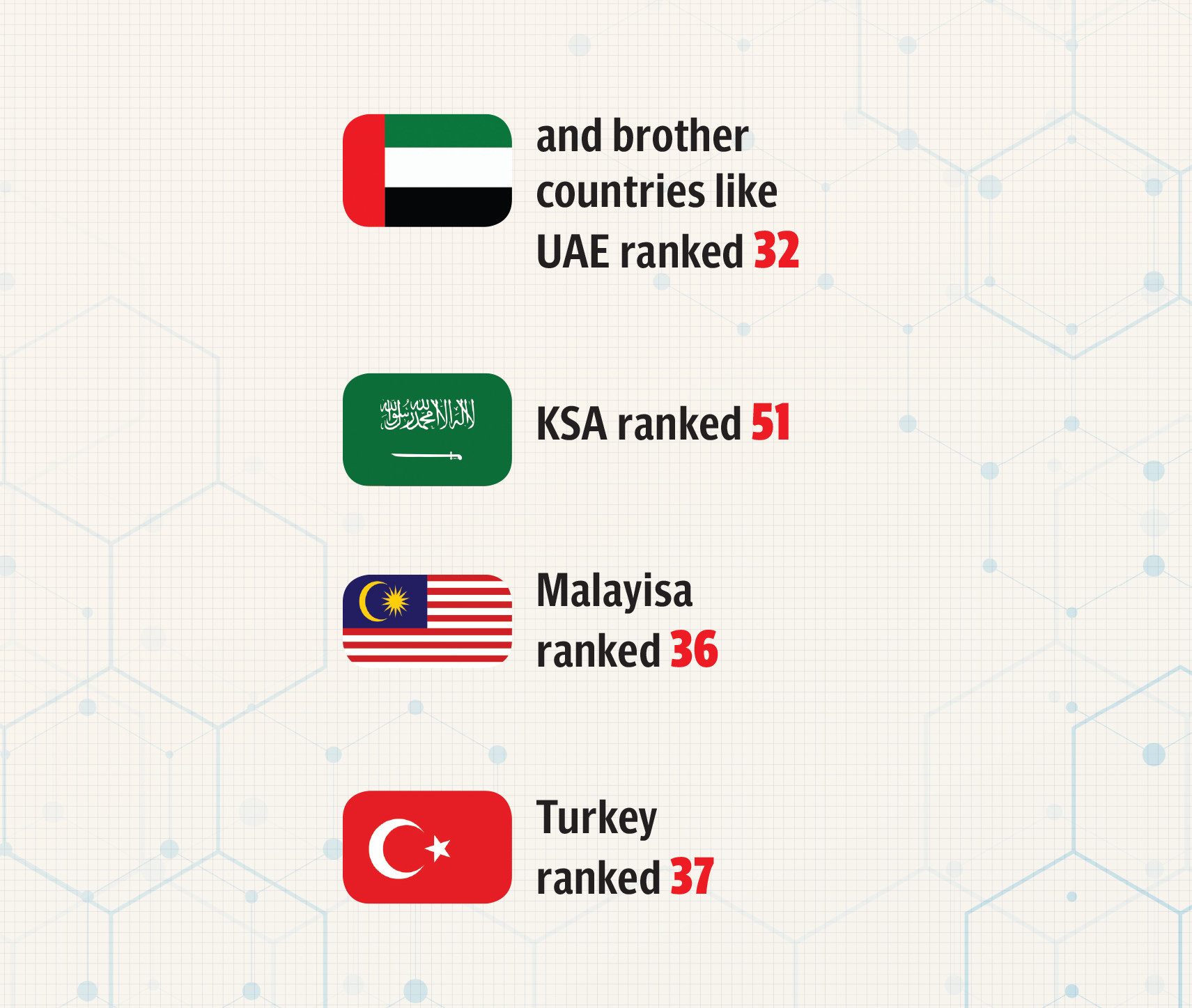
Irresponsible academia
“I have realised that I am a pro-academic,” says Hussain. “Our curriculum is redundant at the primary level and middle level and needs major updation.”
Hussain could not emphasise enough on the education of teachers. “There was a time when the teachers taught moral values, today our teachers do not pay any heed to this aspect, they just teach course work,” he says. “A healthy academic sector always plays a significant role in the nation building process, which gradually failed in our case. This is an unplanned and unimagined result that the society has to experience as a consequence of diverting its respect criterion from nation builders (teachers) to nation controllers (power).
Glamorised law-and-order departments
“While the law-and-order situation is terrible, the law-and-order departments have been unnecessarily glamorised in our country,” Hussain points out. “They have been given unnecessary power and perks which should be cut at all costs. If science-led development is our national goal, R&D should be glamorised and researchers should be respected and acknowledged both at the government and society levels. Young researchers are often demotivated because their friends in law-and-order departments are doing much better. R&D is a hard work. How can we attract young people to come forward for scientific research, if all they want to do is to take commission exams or study law and go into police or become a judge, make money and enjoy power. Why would they opt for R&D?”
Meritocracy
Each political government appoints their own people in departments and there is no concept of the right person for the right job, Hussain laments. “Government officials, especially meritocrats behave as though we are an occupied nation,” he says. “This approach and attitude are outdated. The British have left, their training is redundant. Government officials should be trained to help, serve, and motivate people. This is the only way we can build national enthusiasm and national goals or else we will remain behind the rest of the world with our divisive policies, while talent drains from our country.”
What’s happening at people level
Talking about factors that have impacted R&D at the individual and national level, Hussain says, “I consider individual and national levels as the people level. People are not motivated for R&D. There is no ownership.”
Why is there a lack of ownership for the country? “As people don’t own that much in the country, they are not interested in its development,” he says. “Another issue is our mindset of wishful shortcuts. People want to make money, go abroad and get settled. They don't want to establish a strong base or foundation here, and this trend prevails from top to bottom at every level. It seems Pakistan is a graveyard of retired overseas Pakistanis.”
Hussain feels that our society does not know about the importance of R&D. “Even if 20% of the people know its importance, it would make a difference, but the awareness is limited to university level. People do not understand the need for R&D.”
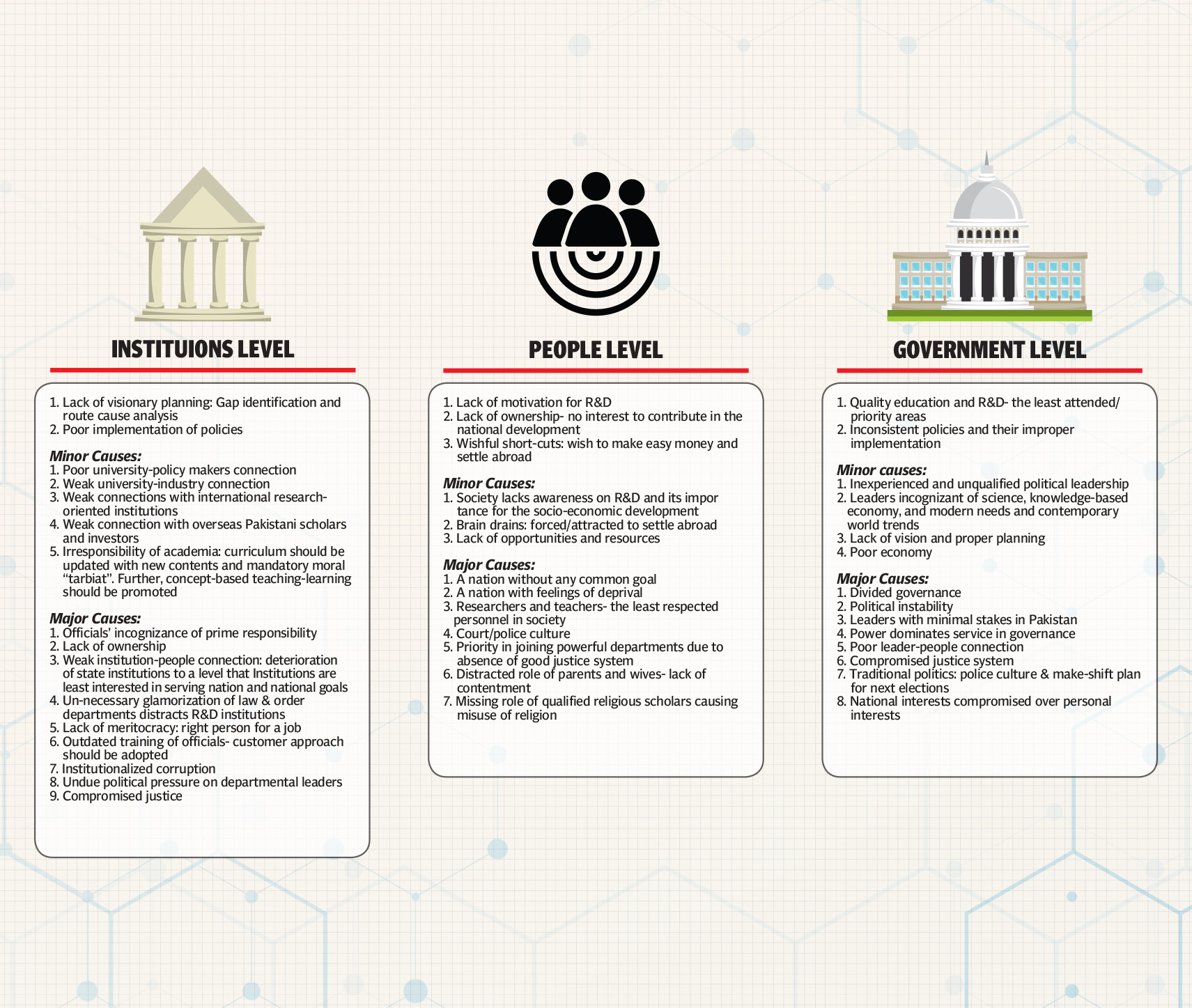
Brain drain
Brain drain is a reality for our country that is consistently being ignored. “If our talent is leaving Pakistan, who will do the work here?” he says. “We are stuck with inconsistency as half undone work is left behind when the talent leaves.”
Why is brain drain happening? “The talent is being forced to leave Pakistan by the officials/institutions who do not do justice, who present them with corruption and eroding in their work,” Hussain alludes. “When scholars and researchers are not treated properly, they leave for opportunities abroad, which are plenty, while the country has a dearth. I feel that nowadays forced brain drain is happening more than attracted brain drain.”
No national goals
“We are a distracted and divided nation without any common goals,” says Hussain. “The reason for this is perpetual political instability, which makes people feel deprived. When a nation feels deprived, they have no goal. They disown the country — a gigantic set-back for a nation.”
Hussain believes that researchers and teachers have no respect in our society. “Ek policeman, ek scientist pe bhaari hai,” he says. “As a nation and society, we have prioritised law-and-order and bureaucracy, hence that have got promoted.
How does one end the court-police culture? “I am from a village,” he shares. “Things are so bad there that if someone starts to shine in a village or a small town, the negative element will join hands with the police, dump a case on him and destroy his future. We have to end this type of culture. But politicians who can play a positive role in eradicating it are actually a part of this culture that is strongly prevalent in villages. This is why, pushed by the justice system, young people opt for power corridors because that is the only way people can protect their property and families.”
Commenting on our social mores, Hussain says, “Qualified religious scholars don't see their role in society building, they limit themselves to certain topics. Even the morality they teach is limited. In families, parents and wives dream their children and husbands would get powerful jobs. Sadly, scholars and researchers are not paid well even R&D that can make a nation powerful.”
To gain height and world repute in R&D, the society requires a transformation from police culture to science culture, the professor believes.
Pakistan on Global Innovation Index
According to the global innovation index, which is an indicator of R&D, our traditional competitor India is ranked 40. Pakistan is 87, UAE is 32, Saudi Arabia is 51, and Qatar is 53. “Just look how we have regressed,” says Prof. Hussain. “In 1996-2000, when I was a student at the University of Engineering Technology Lahore, students from the Middle East would come here to study. Today they have their own top-ranked world-class universities and research institutions, while we are a way behind. Our polices and progress are sinusoidal with inconsistency.”
